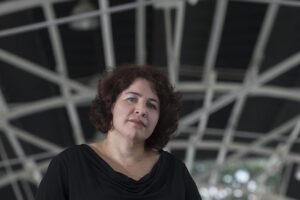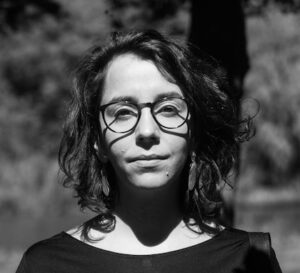A grammar of emotions
by Julia Sanches“Tragedy as a collective historical fact is at the core of Salvadoran identity,” wrote Horacio Castellanos Moya for the World Policy Journal in 2018, citing “the tragedy of the Civil War, the tragedy of the 2001 earthquake, and the current and most perverse tragedy of them all: the gangs, or maras.” More than thirty years before, in 1982, in Salvador, Joan Didion also wrote of El Salvador – then in the throes of a civil war that would last more than a decade, from 1979 to 1992 – that “terror is the given of the place.”
In Claudia Hernández’s Slash and Burn, terror and tragedy are a backdrop, quiet and simmering, against which everyday life and small feats of heroism continually unfold.
Didion wrote not only of terror but also of incertitude. “The place brings everything into question,” she writes, and later, “actual information was hard to come by” and “even la verdad, the truth, was a degenerated phrase.” But Didion had come to El Salvador as a journalist trying to grasp the truth of that civil war and that place from the outside. The result: a slender book full of names, acronyms, attributions, and figures. Many years and several tragedies later, the El Salvadoran Claudia Hernández would write into this incertitude from the inside with Slash and Burn, a novel meaty with uncertainty, a nameless, placeless, and timeless account of the war and postwar of El Salvador.
The second half of the twentieth century was a time in Latin America – and beyond – rampant with proxy wars, and El Salvador was not alone in its fate. (A review in the Colombia-based magazine Revista Arcadia wrote of Slash and Burn, first published in Spanish by Colombian publisher Laguna Libros as Roza tumba quema in 2017: “Here is a story very close to Colombia.”) By not naming and not declaring ownership of this experience of war and postwar, Hernández makes room for others to participate in it in equal measure, weaving an everyman (or rather everywoman) narrative grounded in the small challenges of those usually ignored by history.
None of the characters in Slash and Burn – and only one place, Paris, France – are called by their names. In many cases, a character would have had two names, their war alias and their given name; sometimes three, with the name they adopted after the war. “They’d assumed the surnames of compañeros fallen in battle, or other names which reminded them of neither their pasts on the battlefields nor of their pasts before that,” our narrator tells us. Instead, places and people are denoted with a clutter of descriptors and qualifiers.
Take the daughters, for example, arguably the narrative’s driving force.
The feeling is of a piling-up, an accretion of purpose, ambition, and being-in-the-world. Of connection – between these girls/women and the people, the circumstances, the world around them.”
There is the firstborn daughter, who is also the “daughter in that other country” and the “faraway daughter” and the “missing daughter” and the “distant daughter” and the “daughter they [the other daughters] did not grow up with” and the “daughter she [the mother] lost.” There is the “first daughter she raised,” who is also the “daughter of the partner she was with the day the war ended” and “her daughter nonetheless.” There is the “second daughter under her roof,” who is also the “daughter at university” and the “daughter of a man who was no longer with them.” There is the “third daughter raised by her side,” who is also the “daughter who will travel abroad in her sister’s place” and the “daughter who is in the country where the firstborn was taken” and the “daughter who was helping pay for her sister’s schooling from far away.” And there is the “littlest daughter,” who is also “her littlest and most defenseless daughter.”
The feeling is of a piling-up, an accretion of purpose, ambition, and being-in-the-world. Of connection – between these girls/women and the people, the circumstances, the world around them, all branching like a constellation off their mother and her past. Over and over, Hernández spells out the daughters’ (as well as other characters’) relation to one another – after all, a daughter may also be a sister and, perhaps, at some point a mother, just as a mother may also be a sister and for a while, until her parents pass away, a daughter – and to the space they once occupied and occupy in that moment and would later like to occupy in the world. Slash and Burn ends with the burying of the mother’s mother, and her nullification as daughter.
Lina Mounzer, in her stunning essay ‘War in Translation’, writes:
In the mediatized narrative, your individuality, your personhood, is not a right you are granted by virtue of being human. To become a story worthy of unfolding in the small confines of the mass media, you must earn your individuality by lifting yourself up and out of collective circumstance, either by the exceptionalism of your life or the spectacle of your death.
In Slash and Burn, Hernández resists the pull of story-worthiness and sensationalism by refusing to give priority or accord a unique designation to any one individual. Instead, she allows the collective – and all its individual components – to live, grieve, struggle, and hope as both one and many. This is an act of respect. And Slash and Burn is a book that bursts with respect for the anonymity and memory of the characters who populate it; a book that bursts with respect for the lacunae of information, or the information that we all have a right to keep for ourselves, and that it is sometimes our duty (as it the case of the mother) not to reveal.

A tribute to lost community members of the civil war in Nuevo Gualcho, El Salvador. Amelia Hunt/Wikimedia Commons
But namelessness, ambiguity in its many manifestations, and the resultant opacity, can sometimes put a strain on prose in a way that goes against the grain of writing English-language translations, an act that often demands a constant smoothing out, a clarifying, a striving to make the reader feel comfortable and undaunted. (I often think of the reader’s suspension of disbelief as a layer of ice over a lake just thick enough to step on, but over which I must tread carefully.) When translating a space that is deliberately clouded – in which obfuscated, inexact language is heavy with what is not said and silence, often key to survival, speaks volumes – what should we aim to replicate or carry across, and what shape will this take?
I have found that most of the information needed to determine how a piece of writing should be translated is contained within the piece of writing itself, and that the information or stylistic flourishes the author provides are as important as those she withholds. We know what Slash and Burn is about, but let’s name it: Named after the slash-and-burn method of farming, this is the story of a girl/daughter swept up in a civil war who becomes a woman/mother struggling to make a life for herself and for her daughters in the wreckage of a (victorious) postwar. But what about the texture of the words that compose it? What about the style, the point of view, the narrative energy?
The language of Slash and Burn is limpid and restrained. But it is also oral, which is at times the very opposite of restraint; in speech, we don’t always come at things directly.”
Recounted in a third person at once close and unconstrained, Slash and Burn is a patchwork whose variation in color and perspective is so subtle it can feel dizzying, and our narrator is so tightly bound to the characters narrated, and so deeply chameleonic, that the boundaries between each often blur. In Spanish, which does not need to repeat pronouns quite as often, the ambiguity stems from a scarcity of designation. In English, however, the ambiguity stems from abundance: sparseness translating into surplus. This abundance of third person pronouns contrasts starkly with and thereby emphasizes the paucity of first-person pronouns throughout the novel – in English there are fifteen instances of ‘I’ and in Spanish only four of ‘yo’. In Slash and Burn, the individual flounders.
The language of Slash and Burn is limpid and restrained. But it is also oral, which is at times the very opposite of restraint; in speech, we don’t always come at things directly. Both its syntax and lexicon are circumscribed by the space the text occupies, at the intersection of oral testimony and fiction. Oral: these characters do not use ‘whom’; they dangle prepositions and are free with contractions. Fiction: the characters’ speech remains buoyant, the words and structure of their sentences never lumbering or incorrect; speech is not cited but reported, such that it often seems to dissolve into the rest of the narrative. The feeling should be, I think, of thoughts plucked by the pen of an author of immense empathy from the minds of her characters, then dressed in the language of labor and struggle – in the language of revolution.
I found this most important to bear in mind when translating scenes of apparent violence, tragedy, and terror. The words used are quiet and undramatic; they are reticent yet haunting precisely for what they obviate: “It was said he broke into the houses of the women he desired and stayed there for as long as he liked,” we read, and that he would “put a sharpened machete to the necks of the community’s women and demand they move like he’d told them and do what he wanted.” The prose is spare, almost absent of adjectives or adverbs because none are needed for us to know, for us to project, the sheer terror of the circumstance.
Again, Mounzer:
Translation is not just about transposing words from one language to another. But transplanting a feeling, a way of seeing the world, from one vocabulary of experience to another. I think of the verb, to transplant. A seedling from soil to soil. But also an organ from body to body. The procedure must be as delicate, as cognizant of the original conditions of creation in order to nurture and ensure a continuation of life.
In translating Slash and Burn, I strove not only to transplant the spaces the words occupied on the page – the meaning and heft or levity of these words – but also the texture and feeling of the information withheld, of the empty spaces in between, the fog. I think of something the author wrote me early in our correspondence in response to an email in which I mentioned the books I had been reading to help me get a handle on the voice: “Would it be helpful,” she wrote, “if I told you that what I try to set down (sometimes apparently with masking tape) is the grammar of emotions rather than language? I learned from survivors that this is how to move from thought to speech and from speech to fact.”
It was unseasonably warm when Claudia Hernández and I eventually met for the first and only time. I was on my way to the airport and she was on a break from work, and we sat under the sun in a city that belonged to neither of us. I drank a large cup of coffee and she drank a glass of water and then insisted on paying. I was nervous and talked more than I should have, and Claudia has a gift for asking questions. Her eyes are blueish green and give the impression of soaking up and cataloging every detail around her, no matter how minor. The first thing Claudia commented on when she saw me was how young I looked; from our correspondence, she’d have thought I was a señora. At some point in the conversation, we exchanged admirations, she for all the translation work I do, and I for all the books she writes.
“It’s nothing,” she responded. “I don’t do anything. I just listen.”
from the translator’s afterword to Slash and Burn (And Other Stories, £11.99)
 Claudia Hernández is the highly acclaimed author of five short-story collections and two novels, the first of which was Roza tumba quema (Slash and Burn), published in Spanish in 2017. Her work has appeared in various anthologies in Spain, Italy, France, Germany, Israel and the USA. She was the winner of the Anna Seghers Foundation award (2004), which acknowledges authors interested in making a more just and more humane society through their artistic production. The National Endowment for the Arts has supported the English translation of some of her books that explore the brutal impact of the El Salvadorian Civil War and she was named in Hay Festival’s Bogotá39 list of important Latin American authors. Slash and Burn, translated by Julia Sanches, is published by And Other Stories in paperback and eBook.
Claudia Hernández is the highly acclaimed author of five short-story collections and two novels, the first of which was Roza tumba quema (Slash and Burn), published in Spanish in 2017. Her work has appeared in various anthologies in Spain, Italy, France, Germany, Israel and the USA. She was the winner of the Anna Seghers Foundation award (2004), which acknowledges authors interested in making a more just and more humane society through their artistic production. The National Endowment for the Arts has supported the English translation of some of her books that explore the brutal impact of the El Salvadorian Civil War and she was named in Hay Festival’s Bogotá39 list of important Latin American authors. Slash and Burn, translated by Julia Sanches, is published by And Other Stories in paperback and eBook.
Read more
@andothertweets
 Julia Sanches translates from Portuguese, Spanish, and Catalan. For And Other Stories she has translated Now and at the Hour of Our Death by Susana Moreira Marques, and the forthcoming Permafrost by Eva Baltasar. She won a PEN/Heim award for translating Slash and Burn, and has also translated works by Noemi Jaffe, Daniel Galera, and Geovani Martins, among others. She is a founding member of the Cedilla & Co. translators’ collective, and currently lives in Providence, Rhode Island.
Julia Sanches translates from Portuguese, Spanish, and Catalan. For And Other Stories she has translated Now and at the Hour of Our Death by Susana Moreira Marques, and the forthcoming Permafrost by Eva Baltasar. She won a PEN/Heim award for translating Slash and Burn, and has also translated works by Noemi Jaffe, Daniel Galera, and Geovani Martins, among others. She is a founding member of the Cedilla & Co. translators’ collective, and currently lives in Providence, Rhode Island.
juliasanches.com
Twitter: @sanschaises
Instagram: @sanschaises


